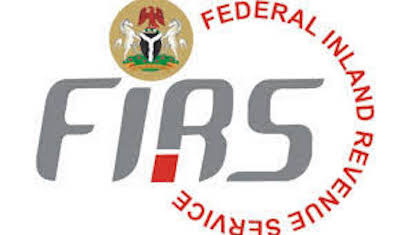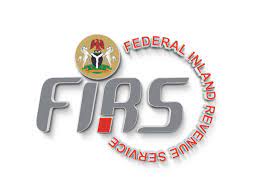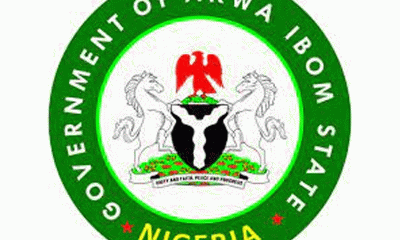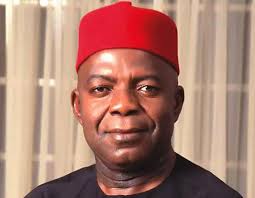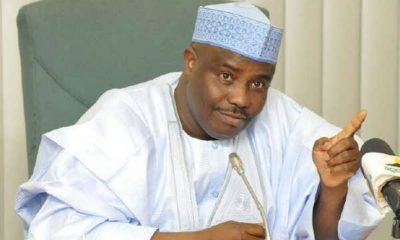Economy
FIRS Proposes Road Infrastructure Funding Scheme For Nigeria

By Tony Obiechina, Abuja
The Federal Inland Revenue Service, FIRS, says it is proposing the introduction of Road Infrastructure Tax in Nigeria, to make the informal sector contribute to building a modern society.
The Executive Chairman of FIRS, Muhammad Mamman Nami, disclosed this on Thursday while receiving a delegation of the Nigeria Union of Journalists, NUJ, led by its National President, Chris Isiguzo, in his office, in Abuja.
Nami said the proposed Road Infrastructure tax to be administered by FIRS, will provide government with adequate funding for road construction, rehabilitation, and maintenance, as well as providing the needed security for roads in the country.According to the FIRS boss, “One quick and very important intervention required of you is in the area of the Road Infrastructure Funding Scheme that the country needs in order fix our roads and bringing the informal sector to the tax net.”
He noted that in many jurisdictions, road users pay for the use of road infrastructure, adding that this should not be seen as an additional burden on the people because it has the potential of making life better for all.
Speaking further, Nami stated that Nigeria’s economy presently relies heavily on non-oil revenues to discharge its statutory responsibility of paying salaries and providing social amenities to the citizenry.
“Without the tax that you pay, governments at all levels would not be able to fulfil their mandate to the electorates. Tax money also helps to ensure the roads you travel are safe and always in good condition,” he said.
He disclosed that the recent rise in the price of crude oil ordinarily should have impacted positively on the Petroleum Profit Tax payable by oil producing companies. However, it has shown otherwise due to some reasons.
On the challenges facing the service of delivering on its mandate, he said “Crude oil production has been limited by OPEC quota. Nigerian OPEC quota as at July 2021 was about 1.5mbpd as against its crude oil production budget of 1.8mbpd.
“This is a shortfall of 300,000 barrels per day. Our average daily crude oil production is around 1.250mbpd as against the allocated 1.5mbpd OPEC quota which has resulted in a shortfall of almost 250,000 barrels per day mainly caused by crude oil theft and force majeure declared by some of the IOCs.
“The total shortfall to FGN budgeted production is about 550,000 barrel per day. “Huge losses brought forward and un-recouped capital allowances reported by most of the companies due to production shut in and the fall in oil price in 2020 as a result of the covid-19 pandemic which reduced their revenue. ”
He said with challenges in the oil and gas sector, reforms have been carried out by the agency with visible impact on the economy such as the deployment of technology in tax administration to improve domestic revenue mobilization in view of dwindling oil prices. Nami added that the service created 10 Value Added Tax, VAT, Regional Coordination Offices across the country to drive collection of VAT.
He said, “We have commenced usage of VAT Form 002A for enrolment and tracking of branch offices of major VAT payers. This will certainly improve our VAT collection and capacity. We achieved 114.66 percent of our VAT collection target in the first half of the year.
“It will interest you to know that the Service collected a total of N4.2trn between January to September, 2021. This feat was achieved as a result of the efficiency and effectiveness of the TaxProMax Solution and intelligence/data we gathered, mined and analyzed in the period under review.
“The Service successfully facilitated both the mock and external audits for the ISO 27001:2013 certification of the Exchange of Information (EOI) centre, to meet international information security management standards.” Earlier, the NUJ National President, Isiguzo, said the visit of the union was part of his resolve to engage critical institutions as a key stakeholder in charting a way forward for the country’s collective good.
The NUJ President described FIRS as a vital institution in the country, which “requires all the support it needs especially at a time when the country is security-challenged, adversely affected by Covid-19 and faced with FOREX crisis as well as political intrigues from different parts of the nation.”
He said the NUJ has noted closely the FIRS’ “strident efforts to shore up the country’s revenue by deploying technology and the requisite personnel in this regard.”
He added, “Of interest to the Union is your digital technology solution, TaxPro-Max. “The numbers show that it has assisted in boosting efficiency in tax administration and collection rates across the country.
“However, with your recent admission that only about 44 million out of a possible 100 million plus pay tax, it makes it urgent for a robust integrated media campaign to get more Nigerians into the tax net.
This the NUJ is willing to spearhead.” Isiguzo assured the FIRS boss and his management team that NUJ will commend the agency where it has done noble.
He, however, noted that the union will not shy away from criticizing the FIRS constructively as well as hold it accountable to the Nigerian people, in line with constitutional guarantee as contained in Chapter 22 of the 1999 Constitution as amended.
Economy
SEC Advocates Advanced Financial Inclusion by 2030

By Tony Obiechina, Abuja
The Securities and Exchange Commission (SEC) has stressed the need for Nigeria to harness its demographic dividend to advance financial inclusion through investments by 2030 for national survival or face deepening inequality.
The Director-General of the SEC, Dr Emomotimi Agama said this at the United Capital Asset Management Investment forum on Wednesday in Lagos.
Agama, in his keynote address titled: “Advancing Financial Inclusion through Investments: Bridging
Nigeria’s Knowledge and Wealth Gap,” said Nigeria must harness its demographic dividend to boost investment.
“Our theme, Advancing Financial Inclusion through Investments, is not aspirational; it is foundational to national survival.
“We stand at a pivotal moment. By 2030, Nigeria can either harness its demographic dividend or face deepening inequality. The knowledge-wealth gap is not merely an economic challenge; it is a moral imperative,” Agama said.
He said the term inclusion should be reframed as active financial involvement, where access meets empowerment, and capital becomes a tool for transformation.
Agama said that closing the financial inclusion gender gap could lift 700,000 Nigerians from poverty.
He said, “Nigeria has a great population yet we have a tiny drop of this number of persons involved in the capital market.
“That one reason for poverty, because we are running from money. We have to do something. Our market capitalisation is an opportunity to do something,
We all have
“We need to change the narrative and move the market forward. We must reach out to make the difference. We are committed to protecting investors and developing the market. Our goal is to do the right thing no matter whose ox is gored. We will work by the principles of fairness and equity to change the market. We will provide a fair ground for everyone to aspire.
He noted that MTN Nigeria’s share offering drew 150,000 new investors – 75 per cent women, 85 per cent under 40.
Agama recommended a four-pillar strategy for bridging the gaps.
He listed the four-pillar strategy as democratisation of financial knowledge, catalyse MSME Investment Channels, blended Finance Vehicles: Partner with Bank of Industry (BOI) to de-risk loans for women-led SMEs.
“We need to educate people about finances. As we drive this market, we do so for a purpose, I enjoin everyone to be the disciple and the apostles. Getting this market to move is a deliberate action,” he added.
| ReplyReply allForwardAdd reaction |
Economy
NPA Assures of Over N1.27trn Revenue in 2025

By Ubong Ukpong, Abuja
The Nigerian Ports Authority (NPA) on Monday assured that it would take into the coffers massive revenue of over N1.27 trillion in 2025, representing a 40 percent increase from the N894.86 billion it realized in 2024.
This ambitious target, the Authority said, was anchored on sweeping modernization efforts, the full activation of the Dangote Refinery’s marine operations, and the deployment of cutting-edge technology to enhance port efficiency.
Managing Director of the NPA, Abubakar Dantsoho, disclosed this in a presentation during his agency’s budget defence session wih the House of Representatives Committee on Ports and Harbours, where he defended the agency’s 2025 budget estimates and provided insights into its 2024 performance.
“Our 2025 budget proposal is more than figures, it reflects our aspirations for a more efficient, globally competitive port system,” Dantsoho told lawmakers, adding that over 70% of the proposed expenditure will go into capital projects.
For 2024, the Authority surpassed its revenue target of N865.39 billion, posting an actual realization of N894.86 billion.
However, Dantsoho revealed that only N417.86 billion, less than half of the approved N850.92 billion expenditure, had been spent as of the time of reporting.
Despite this, NPA made a record contribution of N400.8 billion to the Consolidated Revenue Fund (CRF) in 2024, nearly double the N213.23 billion remitted in 2023. Of this amount, a staggering N344.7 billion was deducted at source.
“This shows our unwavering commitment to national revenue generation, even when our own operational liquidity is affected,” the NPA boss stressed.
Dantsoho said the projected revenue increase is premised on several key assumptions and developments, including: The full operation of the Dangote Refinery, which alone is expected to draw in over 600 vessels annually through its Single Point Mooring (SPM) system; the commissioning of upgraded terminals at WACT and OMT, which will enhance container traffic; the implementation of automation tools such as the National Single Window, Port Community System (PCS), and Vessel Traffic Management System (VTMS); and increased cargo volumes stemming from global disruptions, including the Russia-Ukraine conflict, which has affected global trade routes.
He said the 2025 revenue is expected to come from the following key sources: Ship Dues, N544.06 billion; Cargo Dues, N413.06 billion; Concession Fees, N249.69 billion; and Administrative Revenue, N73.07 billion
Of the proposed N1.14 trillion total expenditure for 2025, N778.46 billion is earmarked for capital projects.
This investment, he said, will target the revitalization of critical infrastructure, including the Calabar, Warri, and Burutu ports and channels, and enhance towage services, channel depth, and compliance with international security conventions.
“Investments in infrastructure and technology are non-negotiable if we are to stay competitive regionally and globally,” Dantsoho emphasized.
He cited increasing competition from neighboring ports and aging assets across Nigeria’s coastal corridors.
The NPA also intends to address technology gaps by upgrading legacy systems and bolstering cybersecurity, ensuring Nigerian ports meet global standards for digital operations.
“We can say that with timely access to internally generated revenue and capital funds NPA would deliver the kind of impact Nigeria expects,” he said.
Chairman of the Committee, Hon. Nnolim Nnaji, urged the NPA to ramp up performance, improve port infrastructure, and play a greater role in addressing Nigeria’s revenue and unemployment challenges.
Nnaji said the ports remain a critical pillar of Nigeria’s economy, and urged the agency to meet rising expectations despite operational challenges.
“No country can thrive economically without high-performing ports. They are the economic heartbeat of every nation, determining how buoyant a country is through the flow of imports and exports,” Hon Nnaji said.
The committee praised NPA for its performance.
Nnaji stressed that the NPA’s performance has implications beyond maritime activity, noting that increased port output can significantly boost job creation across several sectors.
“The Nigerian Ports Authority is not just a revenue-generating agency, it is a national asset in terms of employment and economic impact.
“We expect to see detailed strategies on how to improve revenue generation and expand employment opportunities through your 2025 budget,” he said.
The lawmaker also pointed to growing interest in the development of new ports across the country but cautioned against neglecting existing port infrastructure.
“As we welcome investment in new ports, we must not abandon the old ones. Maintaining and upgrading our existing ports, both in the Eastern Corridor and the Western axis, is essential to long-term sustainability,” he added.
The Committee called for a clear outline from the NPA on how its 2025 financial plan will address pressing national concerns and reaffirm Nigeria’s competitiveness in regional and global maritime trade.
Economy
Senate Sets N10trn Revenue Target for NCS, Urges Agency to Curb Smuggling, Illicit Drugs

By Eze Okechukwu, Abuja
The Senate, through its Committee on Customs has set a revenue target of N10 trillion for the Nigeria Customs Service for the 2025 fiscal year, instead of the initial N6.584 trillion given to her earlier on while urging the agency to clamp down on smuggling and Illicit drugs.
The Chairman of the Committee, Senator Isah Jibrin (Kogi East), who gave the agency the marching order yesterday in Abuja during the budget defence of the revenue driving agency however commended her for exceeding its 2024 revenue target of N5.
079 trillion.The NCS team led by Deputy Comptroller General, Jibo Bello who represented the Comptroller General presented the 2024 budget performance with a revenue target of N5.
079 trillion, stressing that the proposal was exceeded by over a trillion naira.The Committee, obviously impressed by the performance commended NCS before asking them to go ahead and present the 2025 budget proposal, which the agency tied at N6.584 trillion revenue target with an expenditure of N1.132 trillion.
Following their presentation, members of the Senate Committee on Customs unanimously approved the recommendation of the revenue target of N6.584 trillion and the expenditure of N1.132 trillion for the 2025 financial year.
The Committee will subsequently present the budget proposal to the Senate at plenary most likely this week as the red chamber resumes today after a long recess tied to Eid celebration.
In his final remarks, Senator Jibrin emphasised the need for the NCS to rise up in terms of its surveillance with respect to illicit drugs and smuggling “to ensure that, as much as possible, you should be on top of your game”.
He said there are so many illicit drugs flowing all over the place, which according to him “is contributing to the issue of banditry in Nigeria because most of these guys are on drugs. What I’m saying is that, in addition to your revenue drives, you should also be mindful of some of these other functions.

